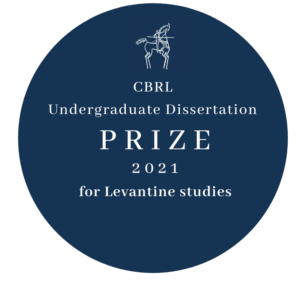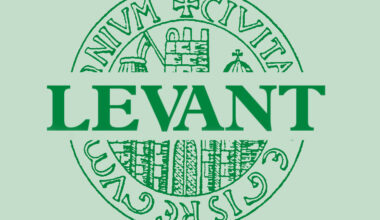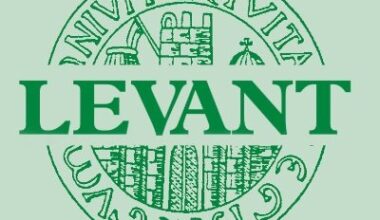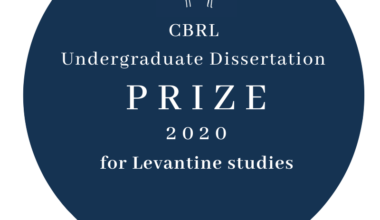 We are delighted to announce the winners of CBRL’s 2021 prize for Best Undergraduate Dissertation in Levantine studies.
We are delighted to announce the winners of CBRL’s 2021 prize for Best Undergraduate Dissertation in Levantine studies.
The 2021 prize for the Contemporary Levantine Studies category is awarded to Andreas Bowen for his dissertation ‘“The Secret Migration”: Documenting the Political Migration of Cypriot Communists to mid-late 20th Century Britain,’ completed at the Department of History, SOAS, University of London. We are pleased to award an honorary mention, also in the category of Contemporary Levantine Studies, to Oliver Simpson for his dissertation “International Law and Commercial and Business Activity in Israeli Settlements: Implications for Conflict Resolution,” completed at the Department of Politics and International Studies, University of Warwick.
The prize for Levantine Archaeology or History has been awarded jointly to Carlota Balcells Guàrdia for her dissertation ‘Why Does Heritage Destruction Happen? An analysis of the motivations for heritage destruction in Mesopotamia through a deep-time perspective’ completed at the Department of Archaeology, University of Glasgow and Kate Honeker for her dissertation ‘De-individualised faces in personal spaces: the Construction of Identity in the Banquet Scene of Palmyrene Tombs’ completed at the Department of Classics and Archaeology, University of Nottingham. We are pleased to award an honorary mention, also in the category of Levantine Archaeology or History, to Katie Brown for her dissertation “Islamic symbology: the Shahada in early Islamic context,” completed at the School of History, Archaeology and Religion, Cardiff University.
Each year, CBRL invites UK based heads of departments and chairs of departmental examination boards to nominate one final year first-class dissertation in Levantine studies, ancient or contemporary.
The prize evaluating committee, made up of CBRL trustees, commented that the winning dissertations showcased work that was highly original in scope and undertaken with excellent understanding of background or context.
Congratulations to our winners!
Undergraduate Dissertation Prize 2021 for Contemporary Levantine Studies
 Andreas Bown – Winner
Andreas Bown – Winner
Dissertation title: The Secret Migration”: Documenting the Political Migration of Cypriot Communists to mid-late 20th Century Britain
“My dissertation focused on the migration of Cypriot leftists to London, beginning in the 1930s, with reference to the interrelated themes of identity formation, individual and communal conceptions of the past and the construction of life-history narratives. Guided by existing scholarship in the spheres of diaspora and migration studies, and oral history methodology, this study opted for a chronological life-history approach in the form of interviews with eight respondents.
I initially set out to capture a snapshot in time and preserve a ‘moment’ in the history of London’s Cypriot community, and perhaps at the same time inadvertently preserve my own family’s story of migration from Cyprus. As the interview process progressed, I became acutely aware that the diaspora, and its’ members conceptions of their identity, are by nature constantly in flux. Highlighting the fluidity of diaspora identity and challenging the concept that diaspora members either assimilate or retain their culture, became as important a motivation as preserving the stories of the first generations of Cypriot leftists. Building on this conception of fluid diaspora identity and Rosemary Baird’s holistic approach towards life-history narratives, this study, rather than examine migration as a single event, instead chose to examine migration as “a continuous process of migrants’ backwards and forwards’ reflection on the meanings of community, historical events and their identity”. Furthermore, this study posited the concepts of Deep Memory, or the anachronistic and ethereal realm of memory typified by memories relating to home villages and family figures, and Surface Memory, or traumatic breaks in life-history narratives, such as suffering persecution due to leftist political identity. These concepts provided a clear framework to understanding the respondents’ pre-migration memories, with deep memory’s anachronistic nature providing a sense of continuity, whilst also allowing Cypriot leftist migrants to contextualise traumatic events that remain un-reconciled in dominant nationalist narratives.
I have graduated from SOAS with a BA in History and Turkish, and I am currently hoping to pursue a career in journalism, with a focus on the Middle Eastern and Mediterranean regions.”
Undergraduate Dissertation Prize 2021 for Levantine Archaeology or History
 Carlota Balcells – Joint winner
Carlota Balcells – Joint winner
“My dissertation used a deep-time perspective to study the driving forces and/or motivators of heritage destruction in three relevant case studies from the geographical region of Mesopotamia.
The three case studies – The Sacking of Ur, The Vassal Treaties of Esarhaddon, and The Islamic State and Heritage Destruction in Iraq – were chosen for their particular circumstantial and chronological characteristics. These were extensively researched by comparing the available archaeological, textual, and cultural heritage evidence. The research carried out revealed that, despite their differences, the three case studies held a great degree of similarity, and so a pattern of heritage destruction was established: when certain political, social and/or religious circumstances occur, there is a likelihood that heritage will become targeted for destruction in order to affect or change such circumstances.
The heritage destruction debate focuses mostly on contingency and recovery plans for when destruction has already happened. My dissertation aimed at understanding why heritage is destroyed in the first place.
This dissertation was written as part of my undergraduate degree in Archaeology at the University of Glasgow. Next year I hope to pursue my passion for the conservation of heritage as a postgraduate student in the field of fine art conservation.”

Kate Honeker – Joint winner
“My dissertation focuses on the construction of elite identity in the banquet reliefs placed in tombs at Palmyra (1st-3rd century CE) to commemorate the deceased. Besides funerary and public honorary inscriptions, literary evidence for Palmyra is scarce and so its art has proved an invaluable source for studying such a unique ancient culture.
In contrast to the single bust portraits that appear in abundance during this period the rarer banquet reliefs depict family constellations, with the deceased reclining at the centre of the scene in a variation of the totenmahl (‘meal of the dead’) motif. Despite the de-individualised faces of the figures my research showcases the great potential for personalisation within the scenes, focusing on costume, priestly depictions, and composition. I explored how these elements might have been utilised to convey wealth, prestige, and the importance of familial ties in elite Palmyrene society.
Following on from my undergraduate degree at the University of Nottingham, I have recently started an Archaeology MRes there. My current research seeks to interpret the banquet scenes within their original tomb contexts. I will be exploring how spatial relationships to other portraits and to tomb architecture might affect our interpretations of the banquet reliefs, and considering how the experiences of those who interacted with the funerary spaces might enrich our understanding of Palmyrene identity.”















